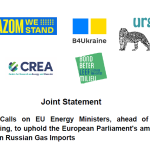As the European Parliament and the Council of the European Union enter the phase of intense negotiations on the Clean Energy for All Europeans package, it is important to underscore that a higher energy efficiency target will help the EU in reducing its greenhouse gas emissions and thus also in implementing its commitments under the Paris Agreement. Therefore, increasing the energy efficiency target should be welcomed as an opportunity to revise the EU’s inadequate climate target and further strengthen the relevant tools, such as the Emissions Trading System (ETS).
In this briefing, CAN Europe first addresses the need to increase the level of ambition of all EU climate and energy targets in line with the long-term objectives of the Paris Agreement. This starts from the recognition that strong climate and energy targets and policies are mutually reinforcing, not conflicting with each other. Secondly, the paper highlights that it is important to acknowledge that the ETS’s own shortcomings, including the existence of a large and growing surplus of unused allowances, will continue to undermine its effectiveness and the price of carbon, unless policy makers show the necessary willingness to tackle them. Last but not least, it reiterates that the Market Stability Reserve (MSR), although not enough to fix the ETS, can help to recalibrate the effect of additional policies, including energy efficiency.
Taking into account that energy efficiency provides multiple benefits for the society and that the ETS is no silver bullet to deliver the vast potential of energy savings in Europe, it is time to focus on the real task ahead, which is scaling up action to reduce greenhouse gas emissions in line with the Paris Agreement.


